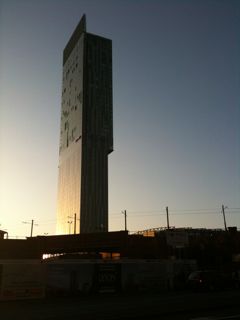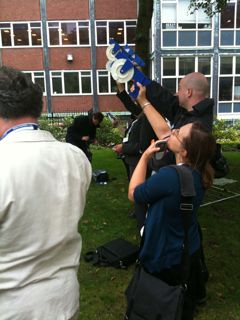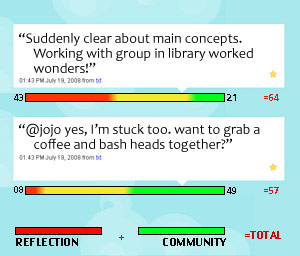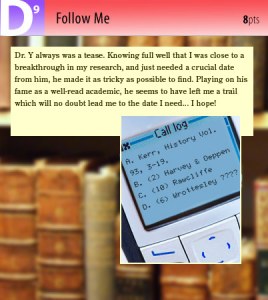In the last few days I’ve come across multiple case studies where standard academic skills or issues have been overlain/augmented with game elements: those pillars of writing, referencing and assessment.
Writing : 750 Words
Mainly aimed at (budding or struggling) authors, nonetheless this site would be useful for anyone having to write very long texts (of which academia abounds). In fact, it was recommended to me by a PhD student, @jennifermjones, who liked the fact that as well as providing space and encouragement (through points) to write 750 words each day, it also analyses themes and patterns within your writing over time. A simple space, simple points, with the addition of some variation with monthly challenges and ‘walls of shame’ or ‘amazingness’. I wonder whether the points, or the idea and well designed site, are more motivating, but it’s certainly a very interesting idea and useful tool.
RESEARCH & REFERENCING: BiblioBouts
…at the University of Michigan is a lovely little project which fits in well with the idea of using elements from the student’s projected context (ie. an effective subject researcher) and bringing out a competitive element within that familiar context. Using Zotero (an online reference manager/sharer), BiblioBouts encourages students to find new resources for a research theme, and then invite other students to rate them for academic suitability/relevance. Points are awarded for both rating/commenting on other students’ resources, and for scores given to their own resources. It will be interesting to see how this works in the coming year, as (much with my own Great History Conundrum) there is potential for students to develop as a community of practice together, gradually increasing their knowledge and skills within a valid research context.
ASSESSMENT: LEE SHELDON’s T366
This is an old chestnut, but worth adding here as it’s been doing the rounds again due to game-related conferences. Sheldon has the benefit of teaching game design to a class of game designers, but even so his approach is an interesting one: instead of grades, he assigns experience points and levels to his students. What has always interested me about this is the way that individual grades are far less important than the gradually increasing levels – which help to show students that essays and other assessment points are just elements (or side quests) within the greater aim (or campaign) of development as experts in the subject.
Within the current debates around ‘gamification’ and the (often unrelated) application of points and gaming systems to real life situations, these three cases are fabulous examples of how game elements can be naturally combined with existing contexts, and strengthen existing elements of academic study.


 My thoughts on the way to ALT-C this year were rather mixed. The problem with all previous ALT-Cs I’d been to has been the predominance of technology-focussed papers, with little in the way of pedagogic thought, evidence-based practice or strong research – so this was a real risk again. On the plus side, I knew many more participants this time round (almost all through my Twitter network) and was looking forward to meeting them and networking; but also, with my day job now taking a focus on distance learning, I was on the lookout for a new range of topics.
My thoughts on the way to ALT-C this year were rather mixed. The problem with all previous ALT-Cs I’d been to has been the predominance of technology-focussed papers, with little in the way of pedagogic thought, evidence-based practice or strong research – so this was a real risk again. On the plus side, I knew many more participants this time round (almost all through my Twitter network) and was looking forward to meeting them and networking; but also, with my day job now taking a focus on distance learning, I was on the lookout for a new range of topics.



